LO 1
1.1 Project outline specifications
Aim- To find the best ways of reducing the amount of waste created at Yo Sushi Restaurant.
Objectives-
- To identify the factors that would help in minimizing the amount of waste created in restaurant.
- To assess the current practices of reducing waste through recycling.
- To be able to recommend better strategies and thus reduce the amount of waste created within restaurant.
Research Questions
- What are the factors that would help in minimizing the amount of waste creating in restaurant?
- How current practices i.e. recycling would be helpful in reducing waste?
- What are the strategies that helps in reducing the waste created?
1.2 The process of research project selection
The factors which contributes to the process of research project selection are provided below:
- The area of interest of research
- Topic of researchers
- Aims and objectives of researchers
- Methodologies and research approaches
Assignment Prime is an online assignment writing service provider which caters the academic need of students.
Get Best Pricing Quotes Free Samples Email : help@assignmentprime.com Order NowMain aim behind selecting this topic is that there is large number of waste created within Yo Sushi Restaurant which is located at Waterloo Station, London and thus it needs to be reused or recycled in such a way that helps in reducing the waste. It is essential to understand the importance of food and thus individual needs to adopt the best possible ways of minimizing the amount of waste created through using reusable bags and keeping the food in that which can be later delivered to needy person (Dou and et. al., 2016). Waste can be in several forms such as wastage of food, or packaging of food is done using plastic bags which is thrown away anywhere etc. Thus, all such waste needs to be managed and undertake effective strategy such as recycling it or providing to poor people so that waste can be properly managed. Here, the main problem being faced while carrying out research is to identify the best ways of minimizing the amount of waste created within restaurant. Thus, it is essential for businesses to undertake effective strategy which aims to improve their business performance and reduce the wastage so that profitability level could be enhanced. Also, researching such issue is crucial as it helps in identifying the needs of overcoming waste created within hotel and thus it could be minimized so that food could be provided to needy person.
Further, it has also been evaluated that packaging of food needs to be done in an effective manner and thus it helps in saving lots of money and reduce wastage. Also, individual buyers needs to made aware about the importance of food and then they should order only that much amount of food which will be consumed by them. Thus, all such actions would result into reducing waste and protecting the environment. Restaurant also requires following proper food safety procedure so that it helps in maintaining cross contamination or improper handling so that waste could be reduced (Neff, Spiker and Truant, 2015). Also, restaurant needs to donate excess food to needy people and thus fight against the hunger. It helps in reusing the wastage of food so that waste management could be created effectively.
1.3 Literature review
Factors that would help in minimizing the amount of waste created in restaurant
As per the view of (den Boer and et. al., 2016 it can be assessed that business needs to adopt effective strategy through which amount of waste could be created within restaurant. Therefore, the food needs to be saved by adopting different recyclable methods used and thus aims to minimize the wastage created within restaurant. However, it is crucial for business to carry out effective methods through which wastage could be safeguarded and thus minimize the wastage created within restaurant. Management of business needs to identify certain ways through which restaurant management needs to minimize waste within restaurant. Carrying out effective strategy which results in improving waste management strategy so that appropriate results could be created so that successful waste could be collected and thus undertake minimum time for utilizing waste so that best results could be carried out. However, (Guerrero, Maas and Hogland, 2013) argued that restaurant needs to create a team who needs to plan appropriate strategy so that waste management could be created within restaurant. Hence, adopting appropriate strategy which results in minimising wastage of food so that recycling of food could be done so that reuse could be done. However, it also results in creating positive image in market as using innovative equipment results in recycling the food and thus manage the wastage of food and enhance the capacity of restaurant. According to Thyberg and Tonjes, (2016) the wastage in restaurants increasing rapidly and management must consider the amount of waste each restaurant generates. Due to lack of waste management strategies the management of the restaurants remain unable and incapable to eliminate or reduce the amount of waste efficiently. From the analysis it was identified that there was approximately twenty-three million tons of food that was discarded in 2007 in Japanese restaurants and hotels. It implies that ample amount of food got waste and thus impact negatively on the reputation of the country. Papargyropoulou and et. al., (2014) argues that in order to reduce the amount of waste in Japanese restaurant, the management and government must work abreast and collaboratively. The management must formulate and implement specific strategies so that the amount of waste food can be decreased efficiently. Eriksson and Spångberg, (2017) said that government of the country must implement certain laws and regulation about food recycling and charge penalties on those restaurants who does not have effective waste management in their premises. It is the duty and responsibilities of the restaurant owners to concentrates on the issue of wastage of food. In the era where resources are becoming sacred and limited, management of restaurants needs to consider the strategies of sustainable growth and development and formulate precise strategies that maximised their sales and minimises the wastage of food. Thus, this will lead the organisation towards growth and development effectively and efficiently.
Current practices of reducing waste through recycling
Currently businesses are carrying out effective practices so that waste so that reduction of food could be created and thus wastage could be minimized. (Maalouf and El-Fadel, 2017) stated that business uses recycling practices in regard to use food packages and thus recycle the same so that it could be used in future. Hence, adopting effective strategy so that best practices could be carried out and thus minimizes the waste through which recycling of food could be done. Currently business uses innovative strategy so that they can reuse the food practices and thus minimize wastage so that needy person could use such food. Hence, it is also one of best practices which results in formulating effective strategy so that wastage of food could be reduced and businesses carry out best practices in order to attain desired objectives. Girotto, Alibardi and Cossu, (2015) contends that in order to increase the sustainable developmental practices, the management of restaurants needs to incorporate the strategies and monitor the amount of waste food periodically. With the help of information and technologies, the management can able to trace the required raw materials and current inventories. This will help them to eradicate the issue of wastage of food effectively and efficiently. Thus, it is recommended to the restaurants owners to implement the use of digital technologies so that they can increase their revenue and reduce the amount of waste food. This will aid in increasing the reputation of the organisation and they can drive on the path of sustainable growth and development. Thyberg and Tonjes, (2016) argues that information technologies requires heavy investments and restaurant owners eschews this requirements. In order to reduce the amount of food waste from their organisation, they must consider the importance of implementation of digital technologies. This can improve the productivity of the restaurant owners and they can increase their profits and sales simultaneously.
1.4 Research Project Specification
Research Philosophy: For the following study, researcher will make use of positivism philosophy as it is well structured and can be used with quantitative and qualitative approaches of research.
Research Design: There are several types of research design which are used by the different researchers in order to carry out their research. In the following research project, author will aim to use the descriptive research design.
Research Approach: The research would be conducted through using qualitative analysis and thus thematic method will be used in order to identify the best ways of reducing the waste created.
Data Collection And Analysis Method: Present research could be conducted through using primary research and thus constructing questionnaire and providing it to respondents for filling their responses would help in obtaining the best information (Silverman, 2016). For the following research qualitative research approach has been applied where various theories are evaluated on the basis of data collected. The data has been collected from primary and secondary sources. Where primary source include observation and secondary source includes various journals articles. Here, respondents are restaurant owners from whom the best possible ways would be identified of reducing the waste created within restaurant.
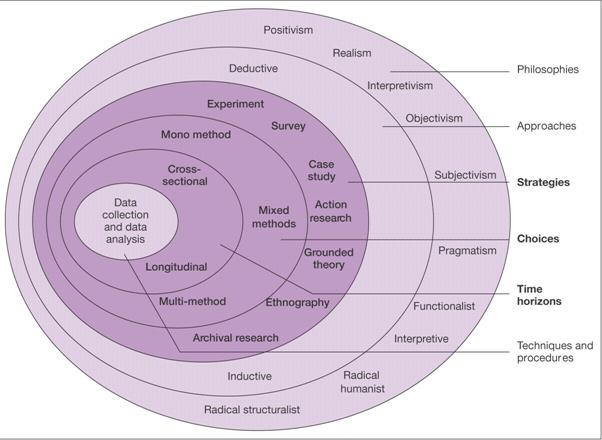
Illustration 1: Research Onion
(Source: Silverman, 2016)
1.5 Appropriate plan of action
Action Plan
The action plan will show the activities that will be covered in the research project. It is formulated below:
- Developing Project: In this researcher will develop the project by using appropriate structure and precise research methodologies.
- Carrying Out Literature Review: In this stage, the researcher will analyse the literature review by identifying and analysing articles jotted by senior researchers and writers which are relevant to the topic.
- Conducting Primary Research: Here the researcher will conduct primary research by analysing the reviews of customers and employees of Yo Sushi regarding food wastage.
- Evaluation Of Data: The data will be evaluated in this phase where researcher takes sample and interprets it in order to produce meaningful information.
- Conclusion And Recommendations: The researcher will summarise all the research in short and brief way which help the end users to comprehend the whole research project.
- Final Submission: The researcher will finally submits the research to the authorities.
Read more samples written by assignment writing experts.
LO 2
2.1 Matching resources efficiently to the research question
For the present research study, the research question formulated by the researcher was “What are the best ways of reducing the amount of waste food at Yo! Sushi Restaurant. In order to answer this question, researcher will be using questionnaire as the research instrument. The questionnaire has been prepared by the researcher and participants of the research was both customers and employees of Yo! Sushi Restaurant. The questionnaire has been provided online using SurveyMonkey.com platform. In this context, the questionnaire template is provided below which match resource efficiency to the research questions
|
Questionnaire for employee Demographic information Name:____________ Age:__________ Occupation:__________ |
|
Q1) Is your organisation waste food?
Q2.) Is your organisation have effective waste management strategies
Q3) How would you recommend improving the waste management strategies of your organisation?
|
|
Questionnaire for customers Demographic information Name:____________ Age:__________ Occupation:__________ |
|
Q1.) Do you waste food at Yo! Sushi restaurant?
Q2) Is Yo Sushi waste management practices is efficient?
Q3) Is Yo Sushi's waste their leftovers instead of recycling it?
Q4) Is Yo Sushi's waste management strategies are effective enough?
|
2.2 Undertaking proposed research investigation
In order to accomplish the aim and objectives of the research study, researcher needs to ensure that precise research methodology will be used. Research methodology is very important aspect of the research and is also considered as the framework on which research study is based upon. In this context, researcher undertakes the proposed research investigation in accordance with the agreed specification and procedures.
Research Philosophy
Research philosophy is the manner through which research collects data, solve case studies and interpret the collected data in most effective and efficient manner. According to Saunders Research Onion, research philosophy is the first area which is need to be covered first after beginning research study (Raynor and et.al., 2017). For the present research study, the researcher has used positivism research philosophy. Positivism research philosophy is well structured and can be used with both qualitative and quantitative study.
Research Approach
Research approach are the approaches used by the researcher in order to testify the hypothesis or research questions formulated for the study. In research study, discussion of approach used by the researcher to accomplish the aim and objectives are very important. Initially there two types of research approaches used by the researchers. These are deductive and inductive research approaches. In the present research study the researcher will use inductive research approach. As inductive research approach is concerned with the generation of new theory emerging from the data.
Research Design
Research design is the plan through which researchers aim to answer the research questions effectively and efficiently. Research design are essential components of the research methodology (Attar and et.al., 2016). Research design helps in answering the research questions more thoroughly and adequately. In order to answer the research question, researcher has used descriptive research design. Descriptives research is used to describe characteristics of a population or phenomenon being studied.
Research Strategy
Research strategies are the plans through which researcher accomplish the aim and objectives of the study. Different types of research strategies has been used by researchers in order to attain their specific aim and goals. In the present research study, researcher has used qualitative research method. Qualitative research method helps in analysing the theoretical data collected from the discussions. Through this strategy, researcher was able to accomplish the desired aim and objectives of the study.
Data Collection
Data collection is the process through which vital information and data has been gathered. In order to conduct the research study, researcher has to collect the data by using appropriate methodologies and approaches (Médici and Allen, 2016). There are two sources for data collection i.e. primary source and secondary source. In primary source, researcher collects data all by himself or herself thoroughly surveying, interviewing, observations or creating focus groups. In the present study, researcher has used questionnaire survey as research instruments to collect the data. Secondary analysis refers to the process of collecting data which has been analysed by senior researchers and authors. In this context, the secondary data will be collected from analysing different articles and journals.
Sampling
Sampling is the process through which small proportion of data has been taken out by the researcher in order to analyse them effectively (Peter, Werner and Alavi, 2017). Analysing large pool of information is pragmatically not possible for researcher and thus, researcher takes sample of data and analyse it appropriately. In this context, the researcher by using simple random sampling method taken out the sample of 30 customer responses. As there are limited employees at Yo! Sushi restaurant at Waterloo, no sample has been taken and all the responses has been analysed.
Data Analysis
Data analysis is the process through which researcher transforms the raw data into meaningful information (Bathelt and Glückler, 2017. ). For research perspective, data analysis plays crucial and important role. In this context, researcher has analysed the collected data and information by using thematic analysis. Different themes has been made for every question asked by the researcher. In this manner, researcher was able to accomplish the aim and objectives of the study.
Ethical Consideration
Ethical consideration are very important aspect of research study. From protecting the anonymity of the participants to securing the research data, it is essential for the researcher to follow ethics and norms of the research before conducting analysis. In this present research study, researcher has explained the participants about the purpose of study. Furthermore, researcher conformed that the participation of participants were voluntary and they can exit the analysis whenever they want. The anonymity of the participants has been maintained by the researcher. All the collected data and information has been secured and only researcher has access to it.
2.3 Recording and collating relevant data
Data collected from employees of Yo! Sushi
|
Q1 Is your organisation waste food? |
Frequency |
|
Yes |
5 |
|
No |
4 |
|
Don't Know |
6 |
|
Q2.) Is your organisation have effective waste management strategies |
Frequency |
|
Yes |
4 |
|
No |
8 |
|
Don't Know |
3 |
|
Q3) How would you recommend improving the waste management strategies of your organisation? |
Frequency |
|
Recycling of food |
4 |
|
Implementation of digital technology |
9 |
|
Implementing other organisations strategies |
2 |
Data collected from the customers of Yo! Sushi
|
Q1.) Do you waste food at Yo! Sushi restaurant? |
Frequency |
|
Yes |
11 |
|
No |
19 |
|
Q2) Is Yo Sushi waste management practices is efficient? |
Frequency |
|
Yes |
13 |
|
No |
15 |
|
Don't Know |
2 |
|
Q3) Is Yo Sushi's waste their leftovers instead of recycling it? |
Frequency |
|
Yes |
16 |
|
No |
12 |
|
Don't Know |
2 |
|
Q4) Is Yo Sushi's waste management strategies are effective enough? |
Frequency |
|
Yes |
14 |
|
No |
11 |
|
Don't Know |
5 |
LO3
3.1 Appropriate research evaluation technique
In order to evaluate the research technique, it is essential and important for the researcher to use appropriate research evaluation technique. In this context, the appropriate research evaluation technique used by the researcher is described below:
Qualitative: The methods of evaluation in which all the tools relating to the theory part are included like thematic etc. is known as qualitative. When the overall data of the research study is based on theoretical concepts, qualitative analysis seems to be fruitful for drive better solutions. In the current study, researcher has used qualitative research method in order to accomplish the aims and objectives of the study.
Quantitative: Quantitative research method helps in analysing the numerical data. In order to analyse the numerical data various tools such as SPSS, etc. has been used by the researcher. These tools helps in identifying median, mode, mean, standard deviation, variance and other statistical values which helps in identifying the precise outcome of the research study. As the present study is qualitative research, no such tools has been used by the researcher.
3.2 Interpretation and analysis of the results
Data collected from employees of Yo! Sushi
Theme 1: Yo! Sushi waste food.
|
Q1 Is your organisation waste food? |
Frequency |
|
Yes |
5 |
|
No |
4 |
|
Don't Know |
6 |
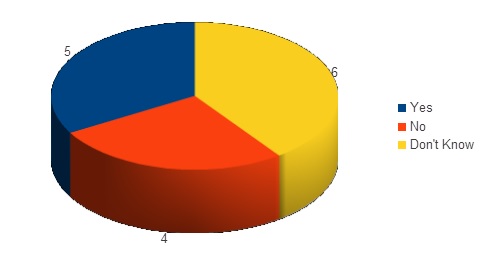
Interpretation: Researcher divided the questionnaire survey into two parts. In first part, researcher asked questions from the employees of Yo! Sushi restaurant at Waterloo regarding the issue of food wastage. In this context, researcher has provided the questionnaire link to the employees of Yo! Sushi. The researcher asked the employees to know whether their organisation waste the leftover food and products or not. In this context, 5 employees agreed that food has been waste in the organisation. 4 employees denied that food has not been waste in Yo! Sushi. 6 employees doesn't know whether food has been waste in the organisation or not. Thus, it implies that food and products has been waste in Yo! Sushi restaurant.
Theme 2: Yo! Sushi does not have effective waste management strategies.
|
Q2.) Is your organisation have effective waste management strategies |
Frequency |
|
Yes |
4 |
|
No |
8 |
|
Don't Know |
3 |
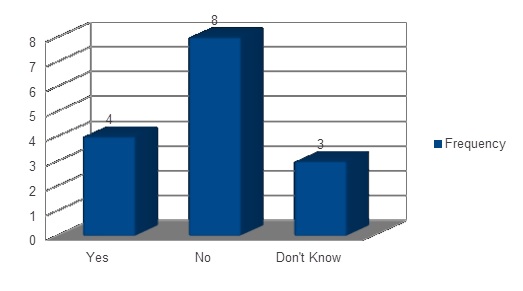
Interpretation: The questionnaire survey which has been conducted online, researcher asked employees of Yo! Sushi whether the management of Yo! Sushi have effective waste management strategies or not. Waste management strategies are essential, especially for food and beverages sector. After analysing the responses, the researcher identified that 4 employees agreed that Yo! Sushi has effective waste management strategies. 8 employees denied that Yo! Sushi does not have effective waste management strategies and 3 employees don't know whether Yo! Sushi have effective waste management strategies or not. Thus, from the analysis it can be understood that Yo! Sushi does not have effective waste management strategies.
Theme 3: Implementing digital technologies in the organisation will help in reducing the waste and improving the waste management strategies.
|
Q3) How would you recommend improving the waste management strategies of your organisation? |
Frequency |
|
Recycling of food |
4 |
|
Implementation of digital technology |
9 |
|
Implementing other organisations strategies |
2 |
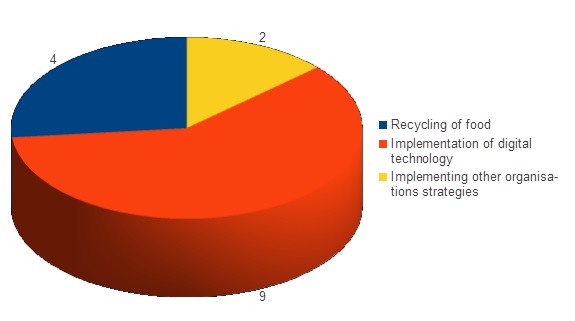
Interpretation: In the questionnaire survey conducted on SurveyMonkey, the researcher provided the questionnaire to the employees of Yo! Sushi. The question was asked from them in order to obtain their recommendations. After analysing the responses, it was identified that 4 employees recommend recycling the leftover food in more innovative manner. 9 employees said that management needs to implement new and latest technologies in order to monitor the food wastage. 2 employees recommended to implement the strategies which has been implemented by other restaurants in order to manage food wastage. Thus, from the analysis it can be understood that implementing digital technologies in the organisation will help in reducing the waste and improving the waste management strategies.
Data collected from the customers of Yo! Sushi
Theme 1: Customers do not waste food at Yo! Sushi restaurant.
|
Q1.) Do you waste food at Yo! Sushi restaurant? |
Frequency |
|
Yes |
11 |
|
No |
19 |
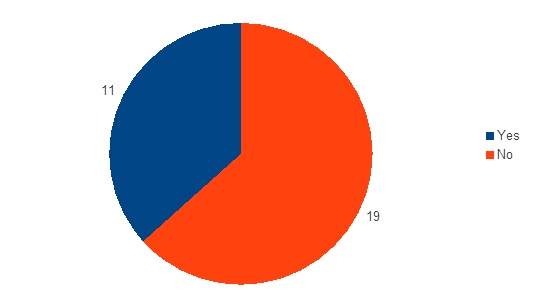
Interpretation: In the questionnaire survey conducted online from the customers of Yo Sushi restaurant at Waterloo, the researcher asked them whether they waste food at Yo Sushi or not. From the analysis of the sample of 30 respondents it was identified that 11 people agreed that they waste food at Yo Sushi. 19 people disagreed that they did not waste food at Yo Sushi. This implied that majority of customers did not waste food at Yo Sushi.
Theme 2: Yo Sushi waste management practices is not efficient.
|
Q2) Is Yo Sushi waste management practices is efficient? |
Frequency |
|
Yes |
13 |
|
No |
15 |
|
Don't Know |
2 |
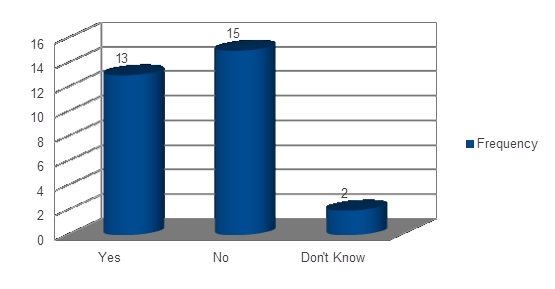
Interpretation: In the questionnaire survey conducted online, researcher asked the participants of the research regarding the waste management practices used by Yo Sushi is effective or not. From the analysis of sample of 30 respondents, it was identified that 13 customers agreed that the waste management practices used at Yo Sushi are efficient. 15 customers disagreed that the waste management practices used at Yo Sushi are not effective and 2 customers doesn't know whether the waste management practices used at Yo Sushi are efficient or not. Thus, from the analysis it can be concluded that waste management practices used at Yo Sushi are not effective as majority of customers disagreed with statement.
Theme 3: Yo Sushi's waste their leftovers instead of recycling it.
|
Q3) Is Yo Sushi's waste their leftovers instead of recycling it? |
Frequency |
|
Yes |
16 |
|
No |
12 |
|
Don't Know |
2 |
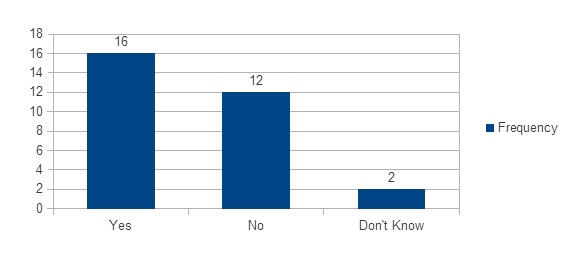
Interpretation: In the questionnaire survey, researcher asked the customers of Yo! Sushi whether the management throw the leftover food instead of recycling it. From the analysis of the sample of 30 responses it was identified that 16 customers agreed Yo Sushi management waste the leftover food instead of reusing or recycling it. 12 customers disagreed that Yo Sushi management waste food instead of recycling it. 2 customers doesn't know whether the management recycle the leftover food or not.
Theme 4: Yo Sushi's waste management strategies are effective enough.
|
Q4) Is Yo Sushi's waste management strategies are effective enough? |
Frequency |
|
Yes |
14 |
|
No |
11 |
|
Don't Know |
5 |
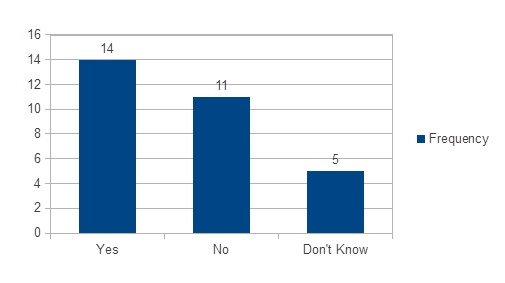
Interpretation: In the questionnaire survey, researcher asked the customers regarding the waste management strategies of Yo Sushi are effective enough or not. From the analysis of the sample of 30 responses it was identified that 14 customers agreed that waste management strategies of Yo Sushi are efficient, 11 customers disagreed that waste management strategies of Yo Sushi aren't effective enough. 5 customers didn't know whether the waste management strategies of Yo Sushi are effective or not.
3.3 Conclusion and recommendations
From the above report it can be understood that business needs to adopt effective strategy through which amount of waste could be created within restaurant. Therefore, the food needs to be saved by adopting different recyclable methods used and thus aims to minimize the wastage created within restaurant. In this context, researcher has examined the waste management practised used at Yo Sushi Restaurant at Waterloo street. The researcher with the help of precise research methodologies able to conduct the study efficiently. In the research study, researcher has prepared questionnaire online using Survey monkey platform and provided to both employees and customers of Yo Sushi. The waste management practices and strategies used by the management of Yo Sushi are not effective enough and management needs to concentrates on improving their existing mechanism so that food waste can be reduce efficiently. In the research study, researcher also analyse and interpret the collected data and information precisely.
Recommendations
In order to reduce the food wastages and leftovers efficiently, the management needs to follow the below recommendations
- Investing in the latest tech: Technologies are very useful for the growth and development of the organisation. Latest technology and automated systems helps in monitoring the inventory efficiently. Thus, it is recommended to the management to utilise those technologies adequately in order to reduce the food wastage.
- Changing menu in order reduce quantity of leftovers: It is recommended to the management of Yo! Sushi to change their menu frequently and provide unique dishes to customers so that the quantity of leftovers can be reduce.
- Recycle stuff which can be recycled: As all the materials cannot be recycled, it is important for the management to know which product can be recycled or not. Thus, it is recommended to the management to focus on the product which can be recycled in order to reduce food wastage.
- Maintaining food log system: Food log system is traditional approach where staff members have to keep daily track of inventory and food products. This will help them to gather knowledge about the existing inventory. Thus, through this they can able to manage the inventory appropriately and eliminating food wastage.
- Food scraps can be used for animal feed: Leftover can be used for feeding animals or can be provided to local farmers. It has two benefits, first the management will be able to earn money out from waste food and second the waste food can be utilise effectively by local farmers.
REFERENCES
- Attar, B. M., Haghighat, A., Naghdi, N., Jokar, S., Nazem, R. and Ghassemi, A., 2016. Acellular Dermal Graft in Secondary Cleft Lip Deficiencies: Assessment of Results With a Reproducible Quantitative Technique. Journal of Craniofacial Surgery.27(2). pp.313-316.
- Bathelt, H. and Glückler, J., 2017. Relational research design in economic geography.The New Oxford Handbook of Economic Geography.
- den Boer, E. and et. al., 2016. Volatile fatty acids as an added value from biowaste.Waste management. 58. pp.62-69.
- Dou, Z. and et. al., 2016. Assessing US food wastage and opportunities for reduction.Global Food Security. 8. pp.19-26.
Avail cheap essay writing service from our essay writers.
u













